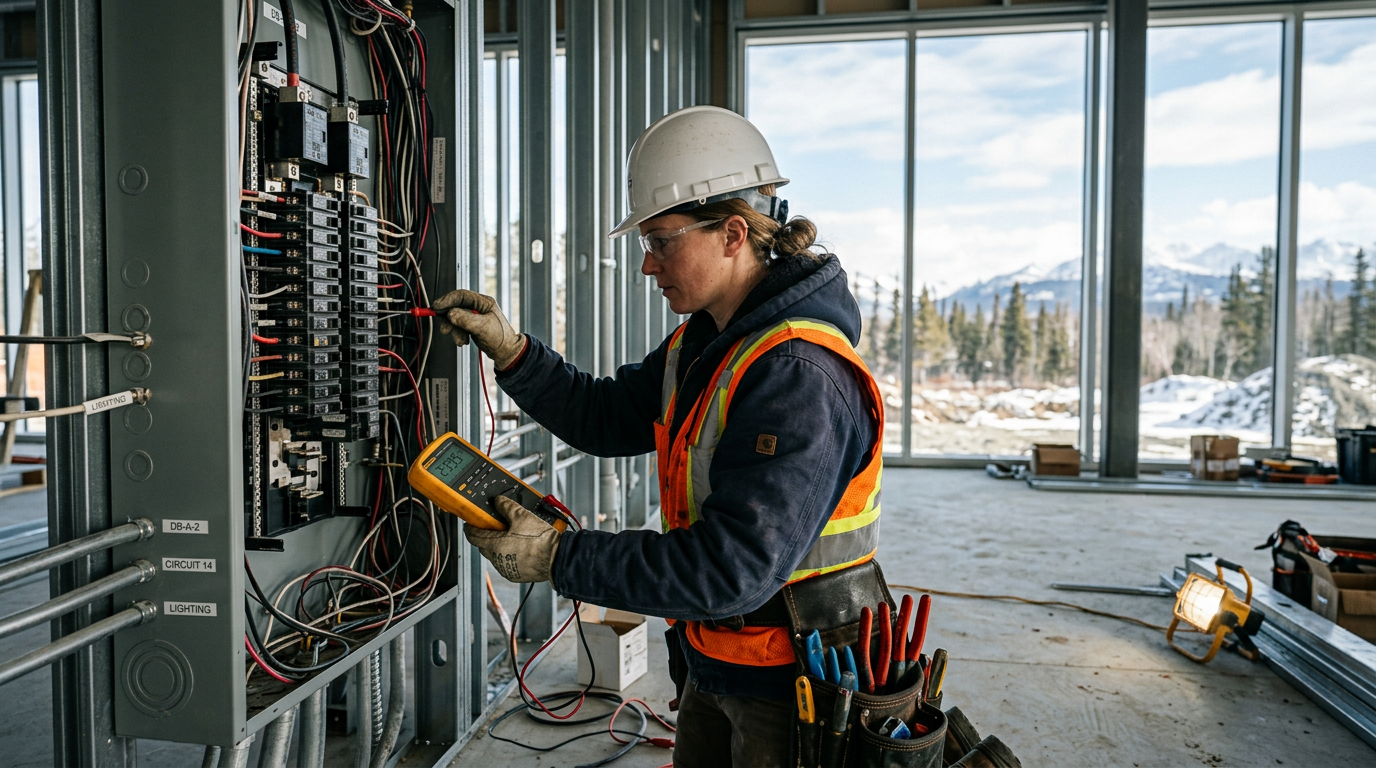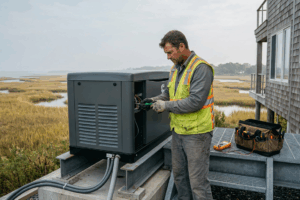
Alaska Electrician License: 2025 Requirements Guide
Alaska Electrician License: Your 2025 Guide to Certification and Career Growth
For electricians, Alaska isn’t just another state—it’s a unique frontier with distinct challenges and incredible opportunities. The construction industry is poised for significant growth, largely driven by federal infrastructure funding and major energy projects. This boom means a high demand for skilled, licensed electricians. Whether you’re starting your career or looking to advance, understanding the specific requirements for an Alaska electrician license is the first step toward success in The Last Frontier.
Navigating Alaska’s licensing system can seem complex because it’s split between two different state departments. Individual electricians who perform hands-on work hold a certificate of fitness issued by the Alaska Department of Labor and Workforce Development, while supervising electricians hold an electrical administrator license from the Department of Commerce, Community, and Economic Development. This guide will clarify these paths, outline the 2025 requirements, and show you how to build a thriving career in Alaska’s dynamic electrical industry.
Understanding Alaska’s Dual Licensing Structure
Unlike many states with a single licensing board, Alaska divides its electrical oversight. It’s crucial to know which credential you need for the work you intend to do.
- Certificate of Fitness: Issued by the Alaska Department of Labor and Workforce Development, this is the certification for professionals performing hands-on electrical work. This includes roles like Journeyman Electrician and Residential Wireman. If you work with the tools, you need a certificate of fitness.
- Electrical Administrator License: Issued by the Department of Commerce, Community, and Economic Development, Division of Professional Licensing, this is a supervisory credential. It is Alaska’s equivalent to a master electrician certification in other states. An electrical administrator is legally responsible for ensuring all work done by a company complies with the National Electrical Code (NEC) and state regulations. An electrical contractor business must employ at least one licensed electrical administrator.
Paths to Certification: From Trainee to Journeyman
For those performing electrical work, the goal is to obtain a certificate of fitness. The journey starts with on-the-job training and progresses through different levels of certification.
Residential Wireman Certificate of Fitness
This certificate is a common starting point after initial training and is ideal for electricians focusing on the housing sector.
- Work Experience: Applicants need a minimum of 4,000 verifiable on-the-job training hours in the electrical trade. Up to 500 hours of related classroom instruction can substitute for work hours.
- Scope of Work: This certificate allows you to perform residential electrical wiring.
- Examination: You must pass the state-administered PSI electrical exam for residential wiremen.
Alaska Journeyman Electrician
The journeyman certificate of fitness allows for a much broader scope of work, opening doors to commercial and industrial projects across the state.
- Work Experience Verification: A total of 8,000 on-the-job training hours are required. Of these, a minimum of 6,000 hours must be in commercial or industrial settings. A maximum of 2,000 hours can be from residential work. Up to 1,000 hours of approved classroom training may be used toward the total 8,000-hour requirement.
- Examination: A passing score of 70% on the Alaska journeyman electrician exam, administered by PSI, is required.
- Career Path: Becoming a journeyman is a significant milestone and a prerequisite for those who eventually want to supervise projects. For more on the overall process, see our guide on how to become a licensed electrician.
The Peak of the Profession: The Electrical Administrator License
For journeymen ready to lead, the electrical administrator license is the next step. This credential shifts your role from performing work to supervising it, taking on legal responsibility for code compliance and safety. It is a mandatory credential for anyone wishing to start their own electrical contracting business. For more details, explore our guide on starting an electrical business in Alaska.
This license has several categories, such as Unlimited Commercial Wiring, Residential Wiring, and Controls, among others. Each category has specific experience requirements. For example, the Unlimited Commercial Wiring license requires at least four years of experience in inside commercial wiring, with at least one of those years served as a journeyman electrician.
Biennial License Renewal and Continuing Education
Maintaining your Alaska electrician license or certificate requires ongoing professional development. All credentials follow a biennial license renewal cycle, but the specifics for continuing education units (CEUs) differ.
The requirements are as follows:
- Journeyman Electrician & Residential Wireman: To complete the certificate of fitness renewal, you must complete 16 hours of continuing education every two years. At least 8 of these hours must be dedicated to the National Electrical Code (NEC). The other 8 hours can be industry-related topics.
- Electrical Administrator: For your biennial renewal, you must complete 8 hours of CEUs focused on the currently adopted NEC.
These CEU requirements ensure that all electricians stay current on crucial electrical safety regulations and NEC updates. For a list of approved courses to meet these requirements, you can browse our courses.
Opportunities in Alaska’s Growing Electrical Industry
The job outlook for electricians in Alaska is exceptionally strong. The state’s construction industry is experiencing a surge, fueled by major infrastructure and energy projects like the Willow Project and Pikka Phase 1. This growth, combined with a statewide push for renewable energy and a shrinking local labor pool, creates a high-demand environment for licensed electricians. The average salary for an electrician in Alaska reflects this demand, offering competitive wages due to the high demand for skilled labor.
This is an opportune time to enter or advance in the trade. For a deeper look into the employment landscape, check out our analysis of the Alaska electrician job market. Also, if you hold a license from another state, it’s worth investigating reciprocity, as Alaska has agreements with several other states. Learn more about electrician license portability to see if your credentials transfer.
Frequently Asked Questions (FAQs)
Alaska Continuing Education Courses
Explore our board-approved continuing education courses for Alaska professionals:
View CE RequirementsAlaska 2023 NEC (Ch 1-4), 8 hours Electrical Administrators License Renewal Package
Alaska 2023 NEC (Ch 4-7), 8 hours Electrical Administrators License Renewal Package
Alaska 2023 NEC 16 Hr Electrical License Renewal Package
What is the difference between a Journeyman Electrician and an Electrical Administrator in Alaska?
A Journeyman Electrician holds a certificate of fitness to perform hands-on electrical work under the supervision of an administrator. An Electrical Administrator holds a supervisory license, allowing them to plan, lay out, and take legal responsibility for the electrical work performed by a contractor. They are Alaska’s equivalent of a master electrician.
How many on-the-job training hours do I need for a journeyman certificate in Alaska?
You need to document 8,000 hours of work experience, with at least 6,000 in commercial or industrial settings, to qualify for the Alaska journeyman electrician certificate of fitness.
What are the continuing education requirements for license renewal?
Journeyman and Residential Wiremen need 16 CEU hours (8 on the NEC) every two years. Electrical Administrators need 8 CEU hours focused on the code for their biennial license renewal.
Disclaimer: The information provided in this educational content has been prepared with care to reflect current regulatory requirements for continuing education. However, licensing rules and regulations can vary by state and are subject to change. While we strive for accuracy, ExpertCE cannot guarantee that all details are complete or up to date at the time of reading. For the most current and authoritative information, always refer directly to your state’s official licensing board or regulatory agency.
NEC®, NFPA 70E®, NFPA 70®, and National Electrical Code® are registered trademarks of the National Fire Protection Association® (NFPA®)






